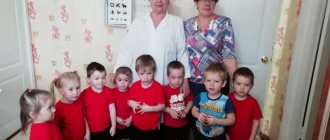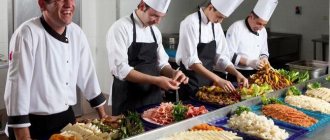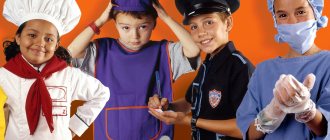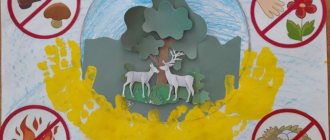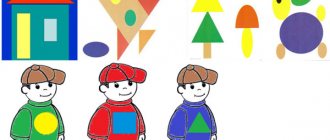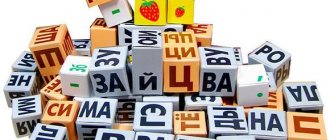Abstract of the educational activity "Profession - doctor" outline of a lesson on the world around us (senior group)
Summary of a lesson on familiarization with the environment on the topic “Profession – doctor” for children 5 – 6 years old
Age: 5 – 6 years (Senior group)
Goal: Expanding knowledge about professions.
Tasks:
1. Enrich children’s knowledge about the work of a doctor and his work activities.
2. To consolidate knowledge about the rules of conduct in the clinic.
3. Enrich children’s vocabulary with medical terms
(medicine, pediatrician, first aid kit, clinic, profession, recipe, phonendoscope, spatula)
4. Activate children’s speech in the use of verbs denoting labor actions (treats, lubricates, examines, bandages, etc.)
5. Develop logical thinking based on the analysis of a range of subjects.
6. Foster respect for the work of a doctor.
Didactic materials: Doll, ball, robe, medical instruments, cards with professions and tools.
Technical means: Multimedia screen, projector, laptop;
Progress of the lesson:
Organizing time:
The teacher stands in the center of the group, rings the bell and says the words:
One two three four five. I invite everyone to play.
Take the card quickly
Use it to find your chair.
— Cards with images of people of different professions are laid out in front of you. Cards with tools are glued to the chairs. You need to choose a chair so that the person depicted on your card gets the tools he needs for his work. For example, I will take a card with a picture of a cook and take a chair with a pot and a knife stuck on it. Take one card at a time and find your chair.
Introductory part:
- Guys, do you hear? What is this noise? (Somebody's knocking on the door)
- Let's see who came to visit us. (The teacher brings a doll familiar to the children) Who came to us? This is our doll Alena. She just doesn’t smile, she’s very sad. Let's find out what happened to her. Will you tell us, Alena?
Doll: I got my feet wet while walking, and now I have a sore throat and a fever.
— Guys, what do you think we should do now? (You need to go to the doctor)
Main part:
- Guys, look at the screen. Who is depicted on it? How did you guess? (By clothes and tools) Do you know where the doctor works? (In the hospital) That's right! A hospital is a place where a doctor works and where sick people lie. And there is also a place called a clinic - doctors also work there, but people only go to them for examinations and are treated at home. Repeat with me - clinic.
- To cure Alena, we will now go to the clinic.
— Tell me, please, do you know how to behave in the clinic? (You must put things in the cloakroom, you must not make noise, you must not shout, you must wait for your turn, you must not litter, etc.)
- Now Alena and I will go to the doctor’s office.
We open the screen, and a doctor sits behind it (the teacher puts on a white coat). He has various medical instruments on his table.
- Hello guys! My profession is doctor. I heal people. There are different types of doctors - children's and adults. I am a children's doctor, and they call me a pediatrician. Let's repeat it together - pediatrician.
Now listen to a short poem:
Sore throat and fever -
Got sick. Well, don't cry.
Will give you a pill and a potion
And the doctor will prescribe the injection.
- Think about how I can help your doll? What is a potion? How can you call pills, injections and medicine in one word? (medicine)
- Now I will show you my instruments, and you name them. (Cotton wool, band-aid, thermometer, bandage, syringe) Well done! Do you know what kind of instrument this is? (The doctor shows a phonendoscope) This instrument is called a phonendoscope. It is necessary to listen to how your heart beats and whether there are wheezes in your lungs. Do you remember? Repeat. Now I’ll listen to Alena for them. Breath! Do not breath.
— And this tool is called a spatula. What can you check with it? (Throat). Let's check our doll's throat. Alena, open your mouth wide and say A.
- Now let’s put a thermometer on Alena. While the doll's temperature is being measured, let's remember what the doctor does during the examination? (Looks at the throat, listens, takes the temperature, prescribes medicine)
- Now go out into the circle. Now we will play the game “What do they do with this item?” I will throw the ball to you one by one and name the object, and you will say what it is for.
a) cotton wool - lubricate wounds.
b) plaster - cover scratches.
b) thermometer - measure temperature.
c) bandage - bandage wounds.
d) syringe - they give injections.
d) spatula - examines the throat.
f) phonendoscope - listens to a person’s heartbeat, etc.
- Fine! Now we'll take a little rest.
Physical school
| Oh, oh, oh, how it hurts, Vanya cries and screams. | We shake our heads, hands on our belts. |
| I fell while playing in the garden, What a scratch! | Squat |
| The doctor put glasses on his nose He examined Vanya’s leg. | We connect the thumb and index finger and bring it to the nose. |
| I took out iodine and anointed the wound Ivan, who is ill. | Bend over and stroke your knees |
Gymnastics for the eyes:
“Your eyes need a rest”
| So that the eyes need a rest. | We close our eyes. |
| The doctor advised me to sleep. | The eyes are still closed. |
| The eyes will wake up and run. | We open our eyes. We move the pupil in a circle clockwise and counterclockwise. |
| And they will blink many, many times | We blink our eyes frequently. |
| My eyes felt good. | Lightly touch your closed eyes with your fingertips. |
| Everyone will see my eyes! | We open our eyes wide. |
- Look, our Alena is smiling! The doctor examined her and prescribed treatment. What is this piece of paper in her hands? What did the doctor prescribe for her? (Prescription for medicine). Where can I buy medicine? (At the pharmacy)
— Each of us keeps medicines and other medical supplies at home. Do you know where they should be stored? (In the first aid kit)
— Do you think it’s possible for children to use a first aid kit on their own? (No)
- All children must remember that only adults can use the first aid kit, and in no case children! It stores medications and supplies that can harm us if used for other purposes! — And if you get sick at home, what do you need to do to get a doctor to come to you? (call, call him on the phone)
- Who can tell us how to call a doctor by phone? (dial 03)
— What do you think would happen if there were no doctors?
Final part:
- Amazing. Now it's time to check what you remember. Now you and I will choose what a doctor needs to work. The game is called "The Fourth Wheel".
- Very good! What profession did we meet? Who did he treat? Do you remember the name of the doctor who treats children?
PROFESSION – DOCTOR
Pimenova Svetlana Viktorovna Pimenova Yulia Nikolaevna teachers of MBDOU "Fedoseevsky DS "Yablochko" of Stary Oskol city district
The material participates in the Municipal practice-oriented competition of professional skills of preschool educational institutions teachers within the framework of the municipal scientific and practical seminar “Early career guidance of preschool children”
Goal: To clarify and generalize children’s knowledge about the work of a doctor and some of his work actions.
Tasks:
- Educational: To consolidate and enrich children's ideas about the medical profession in an interesting and entertaining way.
- Developmental: Develop speech and cognitive activity. Activate children's subject vocabulary within the topic.
- Educational: To cultivate interest in the medical profession.
- Equipment: laptop, presentation.
Methods and techniques: show, story, explanation, question, answer, art. word, praise.
Progress of GCD: Educator: Children, today we will talk about one interesting profession. You can guess what it’s called by yourself by guessing the riddle: Who sits at the patient’s bedside, And he tells everyone how to be treated. Those who are sick are offered to take drops, those who are healthy are allowed to take a walk! Who is this? Children: (doctor)
Educator: That's right, but they also call him doctor. Teacher (shows a doctor doll): Look carefully at the doctor. What is he wearing? Children: Robe
Advertising message
Educator: Pay attention to the device on your neck. It's called a phonendoscope. Educator: Where does the doctor work? Children: In the hospital and clinic. Educator: What does a doctor do? Children: Treats patients, gives injections, takes temperatures. Educator: Correct. How do you think a doctor benefits people? (children's answers)
Educator: Our doctor has an interesting suitcase, what do you want to find out in it? Children: Yes.
Teacher (shows medical instruments): Look how many different instruments a doctor needs to treat people. Let's name them. Children: Syringe, Thermometer, Bandage, Phonendoscope, Cotton wool, Spoon. Educator: That's right, well done.
Physical exercise.
We clap our hands, clap, clap clap over our heads We stomp our feet, stomp, stomp raise our knees high Shake our heads head forward back move We raise our hands, we lower our hands raise, lower We squat low and straight we stand up squat and jump Hands down , on the side. Unclench - into a fist Hands up and into a fist Unclench to the side Rise on your tiptoes Squat and straighten up
Educator: Children, we will now find out what the doctor does with these objects in the game.
Game "What are they doing?" Educator: I will throw the ball to you, naming the doctor’s tools, and you will throw it back to me and name what they do with it. With a syringe (injections are made) A thermometer (they measure temperature) A bandage (they bandage it) A phonendoscope (listen to the heartbeat) Cotton wool (lubricate scratches) A spoon (they look at the throat)
Educator: Well done. What is the name of the car the doctor drives? Children: Ambulance. Educator: Correct. (slide number 4)
Educator: Children, how should a doctor treat people? Children: With respect, kindness, love, help. Educator: So what profession were we talking about? Children: About the medical profession. Educator: Is this a necessary profession? Children: Yes. Educator: Children, you were great today.

